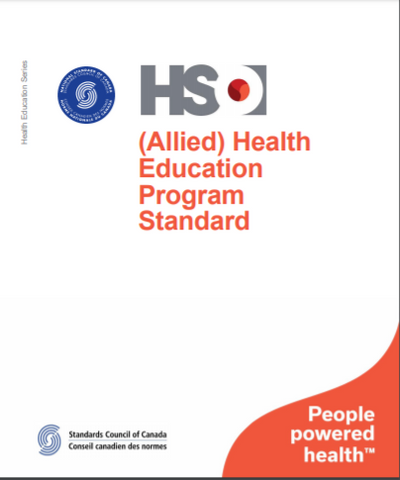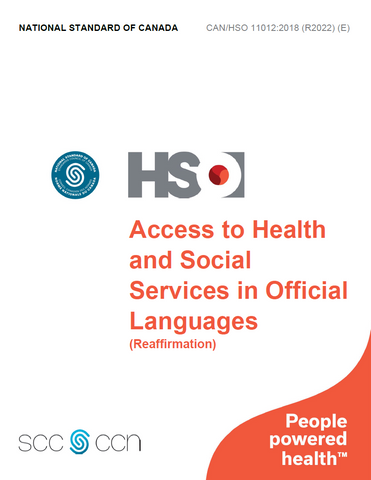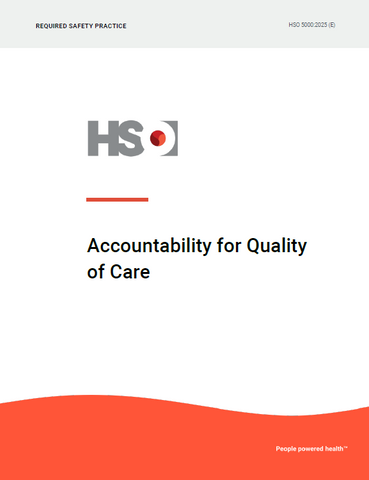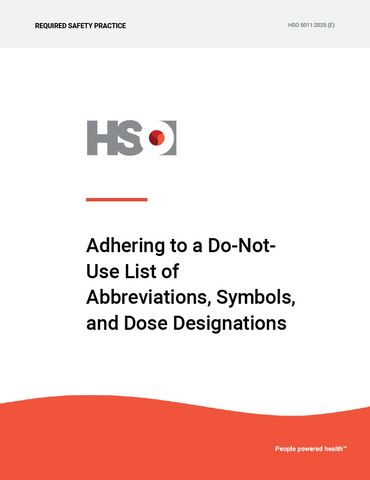
Pediatric Pain Management - CAN/HSO 13200:2023 (E)
About HSO's Standards
HSO’s standards are the foundation on which leading-edge accreditation programs and evidence-informed public policy are built. Our standards enable a strong people-centred health care system that the public, providers, and policy makers can rely on to enable people around the world to continuously improve quality of care.
HSO’s standards are formatted using the following structure:
- Section title. A section of the standard that relates to a specific topic.
- Clause. A thematic statement that introduces a set of criteria.
- Criteria. Requirements based on evidence that describe what is needed by people to achieve a particular activity. Each criterion outlines the intent, action, and accountability.
-
Guidelines. Additional information and evidence to support the implementation of each criterion.
About This Standard
CAN/HSO 13200:2023 (E) Pediatric Pain Management draws on findings from literature reviews, clinical expertise, evidence-informed practices, and those with lived experiences. The published evidence used to inform this standard can be found in the bibliography.
This standard guides the delivery of quality pediatric pain management. It focuses on how organizational leaders and dedicated teams should provide care based on the needs, goals, abilities, and preferences of children and their families. It does not prescribe a particular approach or intervention to pain management.
Foundational to the principles of this standard are the four transformative goals laid out by a 2021 Lancet Child & Adolescent Health Commission (Eccleston et al., 2021):
- Make pain matter
- Make pain understood
- Make pain visible
- Make pain better
The content of this standard is structured into the following sections:
- Make Pain Matter: Establishing a Pediatric Pain Management Framework
- Make Pain Understood: Professional Development to Create a Knowledgeable and Confident Workforce
- Make Pain Visible: Comprehensive Pain Assessment and Reassessment
- Make Pain Better: Co-developing an Individualized Care Plan
- Make Pain Better: Multimodal Pain Management Strategies
- Make Pain Matter: Continuous Quality Improvement for Pediatric Pain Management
This standard is intended to be used as part of a conformity assessment. This standard will undergo periodic maintenance. HSO will review and publish this standard on a schedule not to exceed five years from the date of publication.
Scope
Purpose
This standard aims to enhance service excellence and continuous improvement in the quality of pediatric pain management. It offers organizational leaders and teams who provide care to infants, children, and adolescents (collectively defined as children) and their families, guidance on pediatric pain management practices, professional development, policy development, and quality improvement initiatives.
This standard is intended to provide:
- Organizational leaders and health care teams with foundational information on delivering equitable, high-quality, person-centred pediatric pain management, and ensuring continuity of care for children beginning at birth.
- Children, families, and communities with foundational information on what to expect and how to fully engage in and support quality pediatric pain management as integral members of the care team.
Implementation of this standard will:
- Demonstrate an organization’s commitment to quality and equitable pediatric pain management.
- Recognize children and families as equal members of the care team (referred to as “the team”, see Terms and Definitions).
- Improve consistency and effectiveness of pain management for children and families across the continuum of care and health care settings.
- Ensure pain management is equitable and individualized to address the unique needs of each child and their family.
Applicability
This standard applies to hospital settings that provide inpatient, procedural, and/or outpatient services in children’s, community/regional, and rehabilitation hospitals.
This standard is intended for use by organizational leaders and dedicated teams providing care to infants, children, and adolescents (birth to 19 years less one day) and their families.
Community-based clinics, palliative care, and primary care settings are out-of-scope of this standard. While much of the standard’s content may be relevant and critical to these settings, they require additional consideration for pediatric pain management that are not addressed in this standard.
The following HSO standard may also be relevant:
- CAN/HSO 11013 Cannabis Use for Medical Reasons: Inpatient Care Settings
- CAN/HSO 22004 Mental Health and Addictions Services
- CAN/HSO 5064 Suicide Prevention Program
Acknowledgements
This standard was developed in partnership with Solutions for Kids in Pain (SKIP). SKIP is a knowledge mobilization network funded by the Networks of Centres of Excellence, based at Dalhousie University, and co-led by Children’s Healthcare Canada. SKIP seeks to bridge the gap between current treatment practices and evidence-informed solutions for children’s pain in Canadian health care organizations serving children, youth, and their families. SKIP’s mission is to improve children’s pain management by mobilizing evidence-based solutions through coordination and collaboration. SKIP brings together Canada’s world-renowned pediatric pain research community, front-line knowledge user organizations, and children and families.
Guided by diverse and experienced board members, SKIP capitalizes on the engagement of all Children’s Healthcare Canada member organizations, over 100 additional multi-sector partners, six SKIP hubs (Halifax, Montreal, Toronto, Ottawa, Edmonton, and Calgary), and children and families (using a “Patients Included” approach) to collaborate and co-produce interconnected knowledge mobilization activities.
Users of this standard can refer to the SKIP knowledge mobilization network as a resource for evidence-based best practices for pediatric pain management. Visit their website for more information www.kidsinpain.ca.

HSO is an independent, not‑for‑profit corporation and is registered in Canada as a charity, in accordance with Canada Revenue Agency rules, with a mandate to enable and empower people around the world to continuously improve quality of care.
While designated as a Standards Development Organization by the Standards Council of Canada (SCC), HSO operates independently from SCC. HSO does not receive ongoing funding from SCC, other crown corporations of Canada, or federal or provincial entities.
HSO charges a nominal fee to help offset the associated costs of development and maintenance of HSO standards, as most HSO standards are self-funded.
If cost is a barrier to accessing an HSO standard, please email publications@healthstandards.org and a team member will assist you.
Standards available for purchase through this E-Store are considered HSO standards and must only be used in accordance with applicable HSO Terms of Use or client agreement and are not applicable for assessment purposes. If you are part of an assessment program such as the Qmentum accreditation program, with one of our partners including Accreditation Canada, Qualicor Europe, IQG, or IQMH, your assessment body will provide you with the assessment standard prior to the standard being incorporated into your program and used for surveys or assessment purposes. For information on assessment standards, or to obtain the version specific to your program, please contact your assessment provider.
Standards purchased online are delivered as printable PDF downloads. If you would like a copy printed and shipped to you, please email publications@healthstandards.org.




